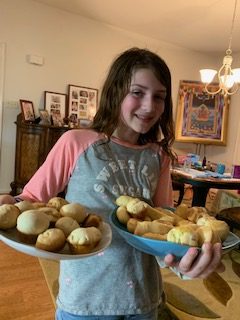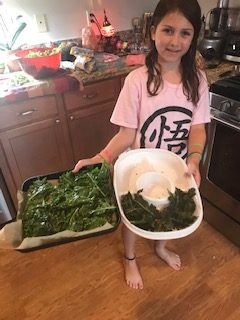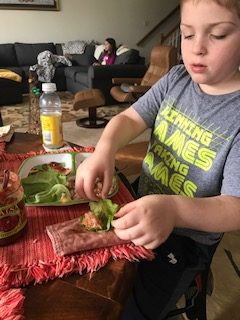Kid’s Fun & Healthy Food Prep
 Introducing your kids to cooking and eating well from an early age is a Gift of Love and Radiant Health & Vitality, to them, their parents, the community and yourself.
Introducing your kids to cooking and eating well from an early age is a Gift of Love and Radiant Health & Vitality, to them, their parents, the community and yourself.
Reverend Rami and Andrea sat down to talk about the different challenges and successes when teaching children healthy habits. Here are some simple tips to help you get started on how to make it more fun:
• Make sure you are in a good mood and can be patient before you start.
• Start by making something they like to eat.
• Tell them what Master Chefs say, so it’s not about you telling them what to do.
• Get them their own gear, utensils, aprons, etc.
• Encourage them to taste along the way, look at the texture, experiment and let them know when it’s right.
• Make sure you have the right ingredients before you begin.
• Involve them in the process. Ask “What are you hungry for? What would you like to
cook today?” Ask if they’d like to learn how to make something and that they don’t
have to eat it. • Praise them.
• Praise them.
• Make your food look like art, arrange it in fun shapes on the plate.
• Have fun getting comfortable in the kitchen.
• Eat in a playful way. Play first, then put snacks out.
These tips are excerpts from a much longer conversation. Read the full interview here.
 FULL INTERVIEW:
FULL INTERVIEW:
Andrea:
One thing I’ve found in attempting to get my son to eat better is that part of the process is me getting out the way. The more I want him to do something, the less he’s willing to do it. I’ve also found that the more fun it is, the easier it is. How do you make eating well and cooking together more fun?
Rev. Rami:
Yes – “getting out of the way is Key.” We start by finding something they love to eat and that’s what we make. Even if it it’s not the healthiest thing. Most of the time children are intimidated because their parents don’t have the time, or the patience, or the interest to teach them. My mom was an amazing woman! She gave me a wonderful education and joy in The Art of Cooking :). In the kitchen, she was patient and created incredible 3 meals a day. She would have called herself “a Homemaker – graduated from The University of Austin, Texas with a degree in Nutrition & Home Economics.” Today we would call her a Master Iron Woman Chef !
 One thing I do is make sure that I’m patient before we start. I take some B vitamins, lemon water (to alkalize) , organic mint green chlorella, if I need to and make sure that I’m in a good space. You have to make sure you’re in the right space for teaching. I usually have fun, pretty music on to help set the mood.
One thing I do is make sure that I’m patient before we start. I take some B vitamins, lemon water (to alkalize) , organic mint green chlorella, if I need to and make sure that I’m in a good space. You have to make sure you’re in the right space for teaching. I usually have fun, pretty music on to help set the mood.
My granddaughter and grandson love pasta so I taught them how to make pasta first. Safe things like how to get the water, gauging the gas flame, staying in the kitchen and not being distracted….and how you always have an adult there. And then we’ll examine the pasta, and I’ll say, “What does the pasta taste like to you now? Oh that tastes too hard? I agree so let’s cook it a little longer, now taste it again…” I had them start to look at the texture and taste it along the way so that they know what “tastes good” and what’s “yucky.”
The first time we tried to make pretzels it was a bust and they tasted terrible, so I said, “Let’s look at what happened. (laughing) Oh, that’s on me, it was the flour, I didn’t get the right kind of flour, so next time we’ll try again.” Making sure you have the right ingredients before you start is another tip to making the experience successful…!
I often refer to the Master Chef shows, so it’s not me telling them what to do. I’ll say, “Master
Chef Ramsey teaches it this way, or this is what my mom would do.” Because if it’s mom and dad telling them what to do again it’s not as fun.
At first, they wanted me to do everything, but then they started to try things on their own. I praise them, but not overly so. And I bought them aprons and child sized utensils. It’s important to have fun and try to not blame them even when crazy things happen!
Andrea:
Sometimes it’s hard to get my son engaged in the first place. Once he’s with me cooking he’s
okay, but it’s hard to get started. For example, when I say, “Do you want to help mommy in the
kitchen?” he says “No.” As opposed to something like, “Hey come here for a second, I want to
show you something.” But that language doesn’t always work either. How do you start the
cooking session with your grandkids?
Rev. Rami:
That is so True with them saying “No !” (laughing). If you say, “Would you like to…,” they say no. So, it’s not that. I’ll say, “What are you guys hungry for?” or “What would you like to cook this weekend?” or “What would you like to make today?” or even “Let’s make…”
When I’m eating something I’ll say, “Would you like to learn how to make this? You don’t have to eat it. I’ll eat it.” That has been a wonderful way for them to learn to make vegetable omelets!! It’s all about having fun and getting comfortable in the kitchen because they feel so happy and proud doing things themselves. I love the spices my granddaughter is creating with her pasta and cauliflower meals!
Andrea:
What age do you usually recommend that kids start getting comfortable in the kitchen?
Rev. Rami:
I had them start really young (2 and up) stirring batter with a wooden spoon and also creating food art. We would arrange food on a plate, like grapes and bananas. And then later I had them put peanut butter on lettuce, or peanut butter and raisins on celery. Each child has likes and dislikes. One child loves carrots and lettuce! Ok – it’s all good :). In the beginning it was about having fun putting things on the plate. And arranging finger foods that they would like to eat in a way that was pretty and artsy.
Andrea:
My son is really picky. It seems like the harder I try to get him to eat something, the more he
fights me, so I just don’t even go there because it doesn’t work.
Rev. Rami:
I hear your frustration…We most likely did that as children ourselves…One step at a time……Hopefully, they will grow out of being picky with time and fun choices. So – we work with being picky with healthy food choices. You get them used to their palette and you encourage them. I listen to what my daughter and son-in-law want for them and try to just blend…..We teach them about the balance of protein and vegetables and carbohydrates and fruit, so I’ve gone really simple with them… but thorough…And then step-by-step I gradually encourage them to eat different kinds of food. Being careful of my attitude …I have to work with that every day! I also encourage eating in a playful way. I’ll say, “Do you want to play a game?” And then after we run around, I put out snacks and they are truly hungry then. Or taking the food outside on the patio on a lovely or rainy day.